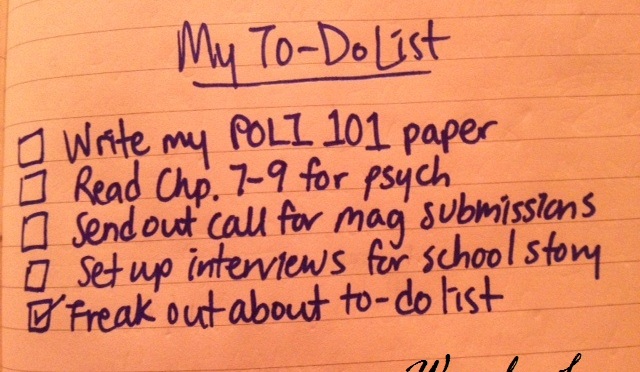#DailyWings: “Life is so constructed, that the event does not, cannot, will not, match the expectation.” -Charlotte Brontë, Villette
This post is a part of my blog series, “Observations of an Editorial Intern” (as inspired by the CAFME Summer Intern Diaries). This series focuses on my experiences of interning as a journalism student for a news publication. Any viewpoints expressed on my blog are not reflective of the publication I work for.
~ ~ ~ ~ ~
It’s been a while since I updated my blog series for this semester,
Observations of an Editorial Intern. Juggling classes, multiple school organizations and an
editorial internship has been both a challenge and a rewarding experience. I’ve become much more attentive to news values, email communication, deadlines and interviewing tactics; at the same time, I am still learning new things every week.
For anyone who is hoping to gain a better sense of a particular field, there is a lot of value in learning from experts — essentially, others who have been working in the industry for much longer. You can ask them about trends they’ve seen over the years, impact on the public and the micro-level details of working in that field on a daily basis. These people can include long-term employees, graduates who have gotten their feet through the door and are navigating the waters, even your mentors or bosses.
As an aspiring journalist, I’ve got a long way to go; in the meantime, I think it’s helpful to learn from people like Mr. Fuhrmann and also pick a few things up along the way on my own. One of the most significant skills I’ve learned — and am still working on — this semester involves meeting deadlines on a regular basis. This doesn’t pertain to just my news internship, but also class assignments and club events. There are always more stories to write, more exams to study for and more emails that need a response. They are all a part of the process of “getting things done,” but that’s much easier said than, well, done. I have yet to discover a formula for being both deadline-driven and well-rested (if someone makes this discovery, please let me know ASAP), but here are a few specific tips I’ve picked up over the past few months that have been really useful:
1) Prioritize your deadlines based on timeliness and importance. Obviously, you would choose to cram for tomorrow’s test rather than edit your job application that’s due in two weeks. But what if you had two exams to study for, or two stories to write? I spend twice as much time reviewing for science exams as I do for humanities classes, mainly because I’m terrible at science. And for stories, work on the article that will have a greater impact and will matter most to the audience, first.

2) Spend a fixed amount of time on research. Before this semester, I used to take hours and hours researching the people I was supposed to interview for stories and coming up with the perfect list of questions. Now, I know there’s no such thing. One, interviews can spin in different directions that lead to many follow-up questions that I hadn’t expected to ask. Two, most of the background information I gather comes from conducting the actual interviews rather than anticipating answers or reading up on every single article ever written on the topic.
Now, I spend about 20 minutes, tops, preparing for interviews. While it’s important to know what you’re getting yourself into, there’s only so much homework you can do before picking up the phone. Get the basics down, then make the call.
3) Focus on one deadline at a time. Point is, multitasking is overrated and can often lead to disappointing outcomes. If you procrastinate and then try to finish a class assignment while writing a story (assuming both are due tomorrow), you end up with an awful — or mediocre, at best — grade, a poorly written article and baggy eyes. Do one or the other, take a short break and then switch tasks. Trust me on this one.
4) Keep deadlines at the forefront of your mind with easy-access reminders. Without Google Calendar and a Moleskine notebook, my world stops turning. And if I didn’t keep up the Sticky Notes on my laptop at all times, I’d forget half my deadlines. Of course, you could argue that having the deadlines ingrained in your mind makes you more anxious about meeting them; I say these reminders keep me going.
I also use Sticky Notes to write encouraging messages for myself, like “You can do it!” or “Finish this essay and you can buy yourself a cupcake from
Sugarland.” Sounds cheesy, but it works.
5)
Get it done, but get it right. With the rise of new media, there’s competition to be the first in posting breaking news. Sites like Twitter and Facebook make this easier than ever now. But in all the haste to hit “Share” or “Publish,” there’s greater potential for making mistakes. Embarrassing ones. My UNC-CH journalism professor,
Ryan Thornburg, always says, “Write the story that gets done.” Whatever you’re working on doesn’t have to be perfect. It just needs to be thorough and accurate. Meet the deadline, but make sure your work is of quality.

How do you manage your time wisely and make sure you meet deadlines in a timely fashion? Do you have any suggestions for balancing classes, work and other aspects of your life?












Thanks for the insight! I also have found that knowing when I am the most energetic and focused is useful because then I can allocate thought-intensive work for those time periods, whereas other more automatic tasks I can do during times when my brain is less smart.
I’m glad this is continuing to give you inspiration in becoming a journalist. I was always pretty good with deadlines, but I must say, I’m so happy not to have them anymore.
I prefer the deadlines i’ve set myself, than any that are set by others for me. But I work fairly well to both :)